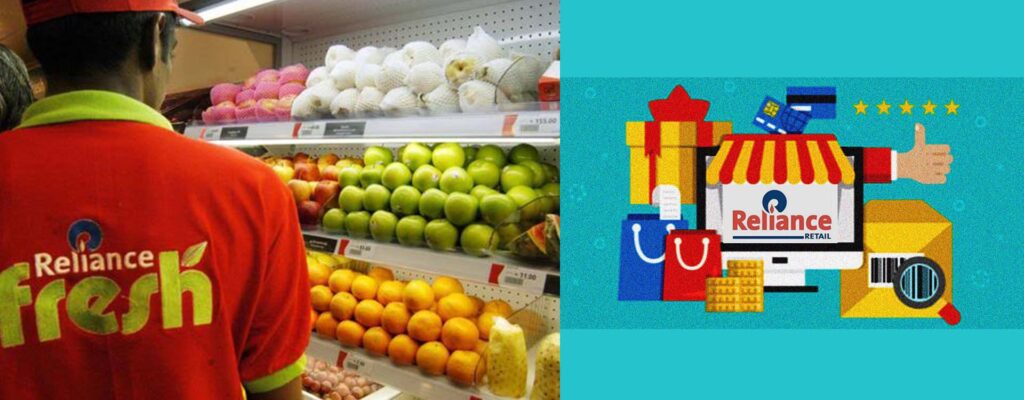When you think of India, what generally comes to mind is the immense population, the crowded city streets and a diverse socio-cultural ecosystem, all of which gives way to one very important factor that makes India one of the fastest-growing economies in the world. That factor is the customers. And who has a larger stake in the market or dominates it more these days than Reliance Retail and its parent company Reliance Industries Limited (RIL)?
You name it and chances are Reliance probably owns it or is a major player in that segment of the market. Everything from Petroleum, textiles, fashion, telecommunications, media and even retail comes under the ambit of this industry behemoth, making it one of the largest and oldest companies in India and making its CEO Mukesh Ambani, one of the richest men on the face of the Earth. For the purpose of today’s deep-dive, this article will be focused on Reliance Retail specifically and the success story behind this historic establishment that has pushed the Indian economy to the forefront of the global game.
Reliance Retail: A Brief Overview
The Reliance Retail initiative by the Reliance group marked the company’s entry into the e-commerce and retail game in 2006. This aspect of the business is a multi-faceted beast that caters to customers across a wide variety of sectors in the retail and e-commerce industry. Since its inception, the organisation has grown exponentially and allegedly stands as the country’s largest retail platform.
While being such a massive company may bring in an idea that it is a very luxurious brand and only sells high-end products, but that is not the case. The very concept of Reliance Retail was conceived under the notion of bringing high-value goods to customers at a reasonable price, a democratisation of commerce if you will, the thing that sets the company apart from the rest is the sheer volume of diversity that comes under the ambit of the retail branch-off.
Reliance Retail operates and maintains a wide network of neighbourhood stores, supermarkets, online and speciality stores as well as wholesale cash and carry stores across the country and caters to millions of Indians every day. In the food and grocery segment Reliance Retail handles Reliance Fresh, Reliance Smart and Smart Point stores. In the electronics product’s category, there are Reliance Digital, Reliance Digital Express Mini stores and Jio stores (which we have become very familiar with over the last few years thanks to its vast location network.) In the Fashion and Lifestyle game, you might have seen stores like Reliance Trends, Trends Women, Trends Man, Trends Junior, Project Eve, Reliance Footprint and even Reliance Jewels.
Of course, what discussion about Reliance would be complete without the mention of Ajio.com, reliancedigital.in and JioMart that together dominate India’s e-commerce industry? To say that it has a diverse range of products and subsidiary brands is an understatement at this point.
‘‘
Reliance Retail is all about bringing value to customers and democratising the retail industry, which is what makes them a front-runner in the race.

Reliance Retail: The Business Model That Paved the Way
Dominating the Market: Start-ups Centric
Reliance as a whole is infamous for how it takes over the market, and that is by targeting and acquiring start-ups and businesses by the bucket-full. While the RIL does have stakes in energy, petrochemicals, textiles, natural resources, retail, and telecommunications that come under the ambit of its own brand name in different branch-offs like Reliance Trends, Reliance Digital and so on, a lot of its success is attributed to the heavy absorption of other businesses which are brought under the brand umbrella.
Since the majority of these businesses already have a certain level of market penetration and working business models of their own, Reliance merely provides somewhat of an upgrade to that using its brand identity, reach and funds to rapidly overtake the market in that particular segment using that business. A good way to envision that tactic is to look at these companies as the tool or vehicle that Reliance uses to expand its reach in the various industries. It is an effective and smart model.
To that end, RIL has some noteworthy start-up acquisitions such as Embibe, Fynd, Grab, Haptik, Reverie, Saavn, Tesseract, Den Networks and Hathway Cable & Datacom Ltd., Hamleys, Netmeds, Asteria Aerospace, NowFloats Technologies, Radisys, Big Bazaar, Balaji Telefilms and Eros International that make up the ranks of the mainstream market penetration formula.
Reliance Retail is a subsidiary that takes this method a step further and currently stands, allegedly, as the biggest retailer in India with over 12,201 stores across 7,000+ cities across India with many of the subsidiaries of retail like Reliance Fresh, Reliance Footprint, Reliance Digital, and Reliance Trends having arrived in most urban areas of Tier 1 and Tier 2 cities.
With this angle, Reliance Trends covers everything from groceries to fashion, footwear, luxury goods like jewellery, e-commerce and even electronics which gives the subsidiary company a wide reach and a great deal of diversity for potential customers to choose from. This feeds the funnel in a very crucial manner.
On the other hand, the fact that they have tapped into the start-up market makes for somewhat of a symbiotic relationship. As Reliance gets the rapid expansion it seeks, small businesses and business owners have the added advantage of being included under the brand umbrella which pulls in a lot of foot traffic for their brick-and-mortar stores as well as their online platforms for those who primarily feature there. Given that India is home to the third-largest start-up ecosystem after the United States and China, it explains how this company has climbed the ranks to the top over the years.
Reliance Retail: Bettering the Lives Campaign
In a unique approach, Reliance Retail has included farmers in its marketing and growth strategy. When you go to the grocery store, you expect fresh vegetables, fruits and other agrarian products for your day-to-day needs such as the wheat that makes up a fresh loaf of bread or the onions you need to cook every day. The point being, we all want the freshest and most authentic farm to table foods, and that is exactly what the ‘Bettering the Lives’ initiative is all about.
Through this expansion campaign, Reliance Retail partners all of its grocery stores with farmers and small producers to bring that farm-to-table approach into reality. This plays to the strengths of the brand being a customer-centric one and at the same time brings these producers to the forefront of the retail business and provides them with some much-needed growth and support as well.
This hyperlocal approach helps not only bring a diversity factor to the brand’s products but aids in making the shopping experience a much more customised one since everything is localised as it should be when it comes to groceries. With that said, this effectively covers the hyperlocal aspect of the company’s reach.
Marketing and Promotion: An Ace Up the Sleeve
Much of Reliance Retail’s publicity comes from the efforts of the parent company RIL and as such, it is a well-known brand. How do they do it you ask? The answer to that lies in the company’s ability to identify what the customer wants and where their attention is. As Indians, our primary pass-time in this country is Cricket, a sport we are known to obsess over, to the point that it penetrates the vast majority of our national mainstream news and media outlets. Reliance saw this and seized the opportunity.
In January of 2008, RIL and CEO Mukesh Ambani acquired the Mumbai Indians team and the accompanying franchise. This proved an instrument of monumental proportions as the brand’s name skyrocketed from there in the public’s eye.
Additionally, Reliance also roped in the Bollywood actor Hrithik Roshan for its Reliance Telecom branch which appealed to the star-power aspect of the marketing plan. With so much celebrity and sports clout giving it the wind under its wings, the company managed to garner a lot of eyes on the business side of things, which greatly boosted its revenue across the subsidiary brands including Reliance Retail. Things were taken a step further when Reliance subsidiary JioMart, which comes under the retail wing, partnered with Facebook-owned WhatsApp to push social media presence for the brand. With this kind of 360-degree perception and marketing execution, supplemented by aggressive brand image building it is no wonder why it has become a household name.

‘‘
Reliance has a multi-pronged marketing approach that engages in the start-up community, provides diversity on a hyperlocal level and makes use of star-power and endorsements to push its reach. It is a genuine 360-degree strategy.
The History Behind Reliance Retail and Its Success
Reliance trends only saw its genesis in 2006, but the success and history of the company stretch all the way back to 1966 when RIL, then known as Reliance Textiles Engineers Pvt. Ltd. was established by Dhirajlal Hirachand Ambani, Mukesh Ambani’s father. Back then it was just a textiles industry that manufactured textures for textiles and slowly grew from there.
The organisation held its IPO in 1977 and in 1985 the name was changed to Reliance Industries Limited, and the rest, as they say, is history. Given its roots, Reliance as a whole, stands as a true legacy brand, being one of the oldest and largest corporate institutions in the country.
Currently, most of us are aware of the clout and infamy that the company has garnered over the years. In October of 2007, RIL became the first Indian company to cross $100 billion market capitalisation and now holds the ranks in the national and international league thanks to the smart business tactics of Mukesh Ambani who really puts the legacy in legacy business as he is the second generation in his family to continue the business his father started all those years ago.
A true rags-to-riches story, Dhirajlal Ambani worked every day of his life to make sure that he and his family never struggled the way his parents did. Today his son continues his dream and stands as the 11th richest person in the world with a company that is pushing India as a nation to the forefront of the retail industry. So, in a way, more than being his father’s legacy, Reliance Retail and RIL stand as India’s Legacy as it continues to pave the way forward in innovation and market dominance.
For more inspiring stories visit our Inspire Section.




